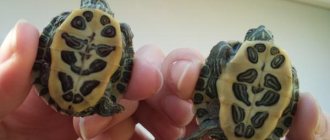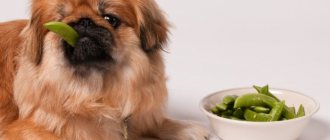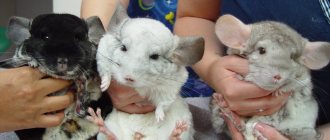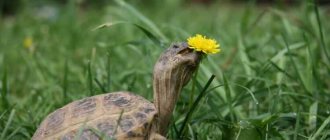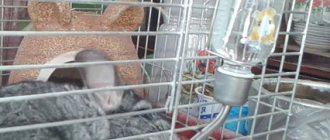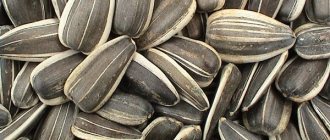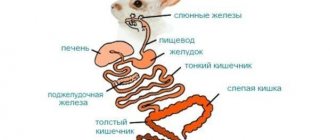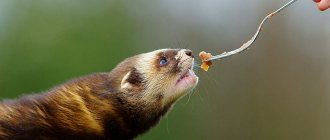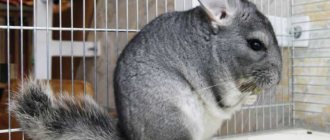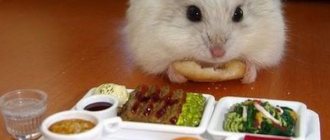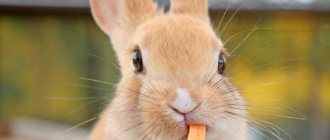Novice breeders ask a fair question: what can they feed a chinchilla at home? The thing is that standard grain food for average rodents does not contain enough useful substances. Therefore, you need to feed your pet a whole list of healthy foods.
In general, little is known about the rules of feeding chinchillas due to the fact that this animal has become popular only in recent years. All due to the fact that they were not perceived as full-fledged companions and smart enough four-legged friends. Let's figure out what stereotypes exist about these animals and which ones relate to their diet.
What do chinchillas eat in the wild?
The fact that chinchillas belong to the order of rodents directly affects what you can feed your chinchilla. In the wild, an animal's diet depends entirely on its exact habitat.
The diet is based on vegetation that is found in high mountain areas. These are mosses, cereals, legumes and other vegetables, twigs of shrubs, and a few mountain fruits.
Interesting! During periods of hunger, rodents even encroach on the bark of trees and cacti.
You must understand that food for chinchillas, like other conditionally herbivorous species, is all living and weaker ones. In the wild, representatives of this species do not disdain insects. This is due to the fact that they often, shortly before the winter period, do not have enough protein food.
Treats
Treats for chinchillas are used not only as something rewarding, but also as an additional source of minerals and vitamins. Most often, treats are given separately from the main food.
As a treat you can give:
- Hawthorn fruits,
- Dog-rose fruit,
- Rowan berries,
- Black currant berries,
- cranberries,
- Apples,
- carrots,
- Hibiscus inflorescence,
- Common calendula flowers,
- Linden flowers,
- Bell pepper,
- parsley roots,
- Dandelion roots.
But what the breeder loves - sweets, cakes, pastries, candies - are unacceptable for feeding chinchillas as treats.
However, many novice breeders try to feed their pets with these harmful products and end up with poisoning, severe diarrhea and even death.
What can you feed a chinchilla at home? Grocery list
The rules for feeding chinchillas at home are not very different from what animals eat in the wild. Chinchillas' nutrition is based on the use of granulated grain food, for example, you can give your ward Vitakraft, Zoomir, Fiory and the like.
You need to understand separately how to choose food for your pet. Now let’s find out what the main diet consists of, in addition to ready-made food.
In addition to food, you must constantly give the animal hay. For greater convenience, it is placed in a hay feeder, which can be purchased at a pet store.
Reference! Grass clippings should be purchased and not harvested yourself. This is due to the fact that most of the grasses of Eurasia are dangerous for these animals.
In addition to dry food and dried herbs, the main diet of a domestic chinchilla includes:
- Apples, cucumbers, tomatoes. You can give the animal about 1/8 of the fruit per day;
- Corn. It is rich in magnesium and potassium, which has a positive effect on the well-being of animals of any age;
- Carrot. Even a small piece of vegetable improves the condition of your pet’s coat;
- Rose hip. The berries of this shrub are given four times a month, this strengthens the chinchilla’s immunity;
- Plantain. This plant regulates the gastrointestinal tract of the rodent;
- Alfalfa. Alfalfa strengthens the animal's cardiovascular system and increases its lifespan;
- Calamus root. Thanks to the use of the root, the animal’s spasms go away and the stomach becomes stronger;
- Honey. You cannot feed it to a chinchilla on a regular basis, but a drop will not harm a sick pet;
- Perga. A few bee bread balls have a beneficial effect on the animal’s health;
- Cereals. Unsweetened oatmeal flakes are beneficial, especially for pregnant females;
- Sprouted grain. It contains a lot of vitamin E, which stimulates cell renewal
- Salt stone. It will help your pet grind his teeth and keep his enamel in order.
Menu of a pregnant female
A pregnant chinchilla may eat a little more than usual. This is normal, but you should not overfeed her, otherwise the female’s health will suffer greatly from obesity. Nutrition during this period changes slightly. Veterinarians advise including in the diet of chinchillas:
- sprouted grain;
- food of animal origin (eggs, milk, cottage cheese);
- more protein due to an increase in the proportion of grains;
- apple;
- bee bread 1-2 balls per day;
- alfalfa, strawberry leaves, calendula flowers;
- rosehip, hawthorn;
- flax seeds;
- cereals;
- vitamins and mineral supplements;
- calcium: a quarter tablet of calcium gluconate or 1 tablet of Excel Calcium per day.
Calcium deficiency is dangerous for pregnant females: it causes eclampsia, which without treatment leads to the death of the animal. You need to exclude mint, thyme and lemon balm from your diet.
Diet
The chinchilla is a small animal. You should not overfeed him, even if it seems that your individual is begging for a treat. How many times a day should you feed your chinchilla?
Advice! This should be done no more than once every 24 hours.
During feeding hours, the animal should be alert, that is, food should be given in the late afternoon. Typically, a chinchilla's bowl is filled with food between 18:00 and 20:00.
Diet example
A person will not like to eat the same food every day. Not everyone can eat buckwheat for a week, for example. So why subject your pet to the same torment? A chinchilla needs a complete and varied diet. It will not only be tasty for the animal, but also healthy. Do not forget that the pet is fed once a day in the evening, when the animal is awake .
On the first day, you should give your pet 15 g of granules. 5 g of rose hips and the same amount of a mixture of corn and sunflower seeds will help supplement the required daily amount of food.
The second day is 20 g of granulated food and 10 g of dried apple.
The diet for the next day consists of 10 g of food in granules, 1/2 walnut kernels and 10 g of a mixture of oatmeal and flax seeds.
There are a lot of menu variations. Use approved ingredients and pleasantly surprise your pet every day.
What should the portion be?
The standard portion for an adult is up to 30 grams of food. For young chinchillas, 20 grams is enough. What can you feed a chinchilla besides food? In addition to grain nutrition, you can give your pet vegetables and pieces of fruit, and special food for medium and large rodents. They can be found at any pet store.
If the animal does not eat all the food offered, gradually reduce the portion. Food should not stay in the chinchilla's cage for a long time, because otherwise it will stock up. They will decompose fairly quickly, creating an unpleasant odor in the room.
Useful! Separately, it is necessary to provide the animal with a feeder with hay and a drinking bowl for chinchillas, stably filled with clean drinking water.
How to choose dry food for a chinchilla?
About 400 grams of food is enough for one adult animal for a month. This is due to the fact that the daily diet consists of only 50% of it, because the chinchilla simultaneously needs fruits, vegetables and certain types of grains; all this is especially true in winter, which historically can be difficult for southern animals to endure.
But this does not mean that the choice of dry food for a chinchilla can be approached irresponsibly. Knowledge about additional food for chinchillas only answers the question “What to feed your pet if you run out of food.” To choose the optimal brand of basic food, you need to compare offers from different manufacturers.
| Name | Peculiarities | Manufacturer |
| Waka High Quality | Waka is created from high quality raw materials, which go through two stages of processing. This food consists of granulated vegetables and pieces of fruit, which provides the animal with a complete diet and a good mood. | Russia |
| Little One Chinchillas | This food is considered the most popular among chinchilla breeders. This is because it is suitable for any chinchilla, regardless of the age of the individual. The composition contains cereals, vegetables and even oatmeal crackers. | Russia |
| Vitakraft Chinchilla Pellets | This diet for chinchillas with malt, enriched with all the necessary vitamins and fiber, helps maintain the health of the rodent. The composition is as simple and natural as possible, so it is suitable even for sick individuals. | Germany |
| JR Farm Classic | Another German product, JR Farm Classic, reduces the unpleasant odor from chinchilla excrement. The packaging of this food looks dubious, but in terms of quality it is considered one of the best in the European assortment. | Germany |
| Versele-Laga Complete | Granulated food Versele-Laga Complete helps to wear down chinchillas' teeth. It contains prebiotics, vitamins and minerals, so the food is suitable for chinchillas that need to strengthen their immune system. | Belgium |
| Versele-Laga Nature | Another product from the same Belgian brand is an assortment of cereals. It also contains fiber and numerous herbs, a vitamin and mineral mix. All this makes the animal’s diet healthy and balanced. | Belgium |
| Padovan Grand Mix Cavie | Italian food entered the CIS zoological goods market quite recently. But it has already gained popularity, all because of its good composition and vitamins, which are usually scarce in chinchilla foods. | Italy |
| Beaphar XtraVital Chinchilla | Food from the popular Dutch company is in great demand in the CIS. This is due to the unique shape of the granules, which helps to wear down the chinchilla’s teeth. And, of course, a composition that meets the European standard. | Netherlands |
| Benelux Grain Free | Belgian food for chinchillas is a combination of flowers, vegetables, fruits, as well as legume flakes, alfalfa seeds, flax and caraway seeds. It is low in carbohydrates, making the food ideal for feeding rodents. | Belgium |
| Lolo Pets Basic | The complete mixture with granules, extrudates, fruits and medicinal herbs also contains vitamins and minerals. An adult chinchilla needs only two spoons of food per day. | Poland |
Grain mixtures
Grain mixtures are a very important component of the diet of domestic chinchillas, saturating the animals’ bodies with vitamins, minerals, fats and proteins. It is recommended that furry pets include the following grains and seeds in their diet:
- buckwheat
is a complex carbohydrate that saturates the animal’s body for a long time, contains iron, protein, vitamins B and P, calcium, phosphorus and iodine; - wheat
is a source of vegetable proteins and carbohydrates with a low content of fats, microelements, B vitamins, and fiber, which stimulates intestinal motility. Eating wheat is important for nursing female chinchillas who require increased care and recuperation after childbirth; - barley
- made from barley, rich in a huge amount of useful macro- and microelements (potassium, calcium, phosphorus, copper, zinc, manganese, iron, chromium, cobalt) and vitamins A, D, E and group B, necessary for the functioning of the nervous system, maintaining the beauty of chinchilla fur and leather; - corn
– contains amino acids and vitamins necessary for the rodent’s body that are involved in the pet’s metabolism; - oats or rolled oats
- a healthy nutritious cereal rich in vitamins A, B, E, amino acids and carbohydrates, helps remove toxins from the body of rodents, recommended for pregnant, lactating females and puppies; - flax seed
- contains vitamins A, B, E and Omega-3 acid, necessary for the reproductive function of pets and maintaining the immune system, the husk of the seeds is an excellent means for removing toxins from the body; - sunflower and pumpkin seeds
– rich in fats, protein and vitamins, used in minimal quantities to prevent pet obesity.
What should you not feed chinchillas?
A domestic chinchilla cannot eat expired grain food. Rot and mold on food in the form of pellets can lead to serious poisoning of the animal or even its death. Before giving food to your pet, be sure to check the expiration dates. If there is any uneaten, stale food left in your chinchilla's feeder, rinse everything out and fill it with fresh dry food for medium-sized rodents.
Yes, you can feed your chinchilla fresh fruits and vegetables. But their condition needs to be monitored. The fruits must be healthy, without damage or signs of rotting. And even before giving food to the chinchilla, vegetables and fruits must be washed. Your pet's wild relatives can eat fruits picked from the ground, but the pet may suffer from intestinal upset.
Important! Another prohibition is an abundance of treats. Here everything is the same as in humans: a large amount of dried fruits and honey will cause problems with the surface of the teeth.
It is better to not give your chinchilla her favorite treat than to later deal with the consequences of losing her teeth or deteriorating their quality. Other prohibitions for rodents include:
- Meat products. Sausages and sausages are especially dangerous for animals;
- Cottage cheese. It, like other dairy products, can worsen the pet’s condition;
- Eggs. They are too difficult for the chinchilla to digest;
- Bakery products. Even crackers without flavoring are dangerous for your pet;
- Raw potatoes. An abundance of starch will lead to digestive disorders in a chinchilla;
- Oak and pear. The bark of these plants is contraindicated - it has a fixing effect;
- Fresh lettuce and cabbage leaves. Such food will take too long to process;
- Chips. They, like other snacks, are not given to any small animals due to the abundance of dangerous substances in the composition;
- Pasta. Processed cereals will not provide any benefit to the four-legged pet’s body;
- Mushrooms. They are not included in the chinchilla's food chain, so giving them is strictly prohibited;
- Roasted nuts and seeds. They contain too many calories for a rodent.
Give seeds and nuts in limited quantities
Sunflower and pumpkin seeds are found in many foods. But now there is a huge amount of controversy about whether it is possible to give seeds and nuts to chinchillas. You won’t find an exact answer here, but I will write to you all the pros and cons of both approaches so that you can decide for yourself whether you can give these products to your chinchilla.
You can only give dried pumpkin, flax or sunflower seeds. Under no circumstances should you give them fried or salted foods if you care about your pet.
Pros of seeds:
- Chinchillas love them very much, this is a kind of treat for them
- The seeds contain useful substances that make the fur thicker and more pleasant to look at.
Minuses:
- Seeds will lead to obesity of the animal if their quantity is not limited.
- Constipation and other stomach problems
There’s no need to say much about nuts; Shushiki simply adore them and it’s hard not to notice with what pleasure they eat them. BUT IT'S BETTER NOT TO GIVE THEM NUTS, because chinchillas have a very weak liver, and nuts are high in calories and difficult to digest. Many owners cannot resist giving the chinchilla her favorite nuts, but believe me, they eat other treats with the same pleasure. For example, I observed that my chinchilla eats dried apples, carrots, etc. with no less pleasure. Therefore, I see no point in pampering with a product that can cause serious harm to the health of my pet.
Useful tips
Keeping a chinchilla and feeding it properly is not difficult. But you can’t do without useful advice from experienced breeders of medium and large rodents.
The following recommendations for inexperienced chinchilla owners regarding nutrition are as follows:
- Determine in advance how much the chinchilla food you will use costs. Set aside money for the maintenance of the animal for a month in advance;
- Do not give your pet candied fruits and dried fruits purchased in a human store. They contain sugar that is dangerous for rodents. Instead, give homemade dried bananas, apples; you can feed your pet with them all year round;
- Choose fairly small granules. So, if a chinchilla accidentally swallows one without chewing, there will be no health consequences;
- Change food regularly, albeit gradually. In order for your animal's stomach to function properly, do not force it to eat the same thing all its life.
